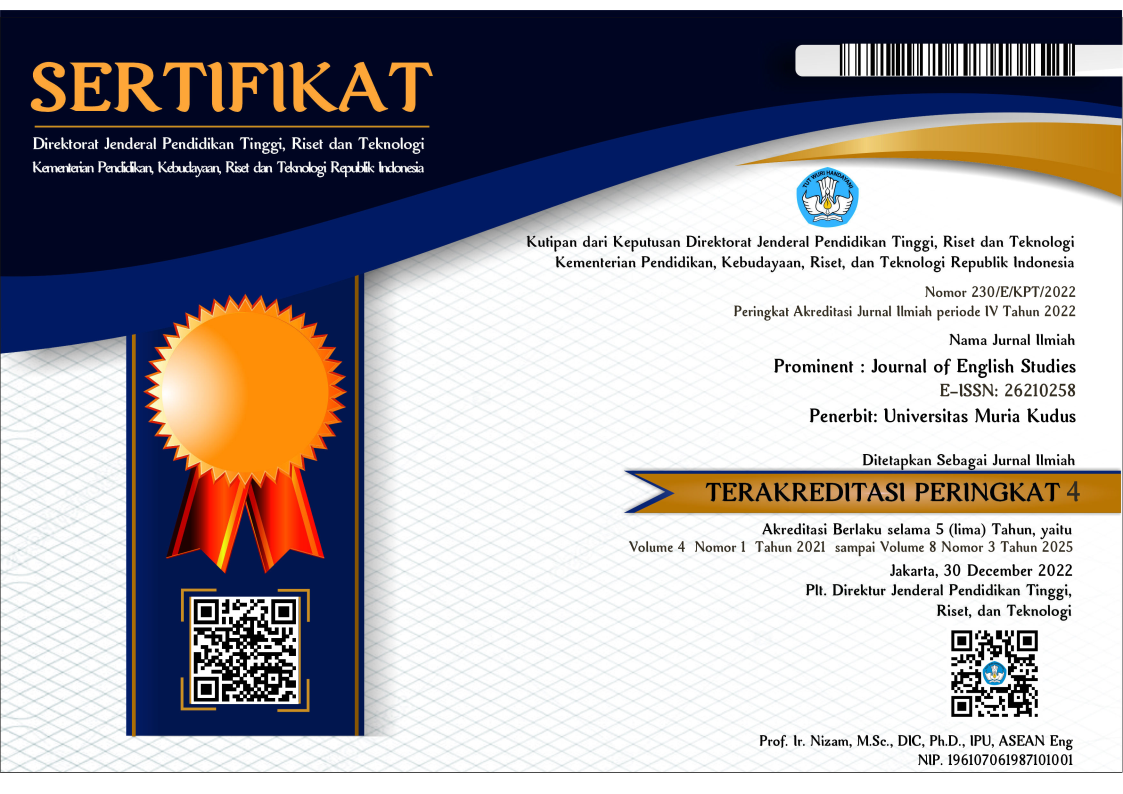CO-CREATION IN TEACHING ENGLISH TO TERTIARY STUDENTS
Abstract
Keywords
Full Text:
PDFReferences
Bovill, C. (2017). A Framework to Explore Roles Within Student-Staff Partnerships in Higher Education: Which Students Are Partners, When, and in What Ways? International Journal for Students as Partners, 1. Bovill, C. (2019). Co-creation in learning and teaching: the case for a whole-class approach in higher education. Higher Education, 79(6), 1023–1037. https://doi.org/10.1007/s10734-019-00453-w Bovill, C., Alison Cook-Sather, & Felten, P. (2014). Engaging Students as Partners in Learning and Teaching (2): Practical guidance for academic staff and academic developers. https://www.researchgate.net/publication/271200592 Cresswell, J. W., & Plano, C. V. L. (2011). Designing and conducting mixed method research. SAGE Publication. Creswell, J. W., & Creswell, J. D. (2012). Research Design: Qualitative, Quantitative, and Mixed Methods Approaches. Fredricks, J. A., Blumenfeld, P. C., & Paris, A. H. (2004). School Engagement: Potential of the Concept, State of the Evidence. Review of Educational Research, 74(1), 59–109. https://doi.org/10.3102/00346543074001059 Giner, G. R., & Rillo, A. P. (2016). Structural equation modeling of co-creation and its influence on the student’s satisfaction and loyalty towards university. Journal of Computational and Applied Mathematics, 291, 257–263. https://doi.org/10.1016/j.cam.2015.02.044 Harvard Family Research Project. (2010). Partnerships for learning: Promising practices in integrating school and out-of-school time program supports. Kaminskiene, L., Žydžiunaite, V., Jurgile, V., & Ponomarenko, T. (2020). Co-creation of learning: A concept analysis. European Journal of Contemporary Education, 9(2), 337–349. https://doi.org/10.13187/ejced.2020.2.337 Lau, J., & Chan. J. (2015). What is critical thinking? . Philosophy Department, University of Hong Kong. Lubicz-Nawrocka, T. (2017). Co-creation of the curriculum: challenging the status quo to embed partnership. Journal of Educational Innovation, Partnership and Change, 3(2). Magolda, B. (1999). Creating contexts for learning and self-authorship: constructive developmental pedagogy. Vanderbilt University Press. Magolda, M. B. B., & King P.M. (2004). Learning partnerships: Theory and models of practice to educate for self-authorship. Stylus Publishing. Mincu, M. E. (2012). Personalisation of Education in Contexts. In Personalisation of Education in Contexts. SensePublishers. https://doi.org/10.1007/978-94-6209-028-6 Selfa-Sastre, M., Pifarré, M., Cujba, A., Cutillas, L., & Falguera, E. (2022). The Role of Digital Technologies to Promote Collaborative Creativity in Language Education. Frontiers in Psychology, 13. https://doi.org/10.3389/fpsyg.2022.828981 Witell, L., Kristensson, P., Gustafsson, A., & Löfgren, M. (2011). Idea generation: Customer co-creation versus traditional market research techniques. Journal of Service Management, 22(2), 140–159. Zarandi, N. (2022). Students’ Satisfaction and Co-creation Behavior in Game-based Learning Environment in Higher Education. Universidadedo Minho. Zmuda, A., Curtis, G., & Ullman, D. (2015). Learning personalized: the evolution of the contemporary classroom. San Francisco: Jossey-Bass, A Wiley Brand.
DOI: https://doi.org/10.24176/pro.v7i2.12313
Refbacks
- There are currently no refbacks.
Prominent Journal of English Studies is licensed under a Creative Commons Attribution-ShareAlike 4.0 International License.
Dedicated to:

in Collaboration with APSPBI:






